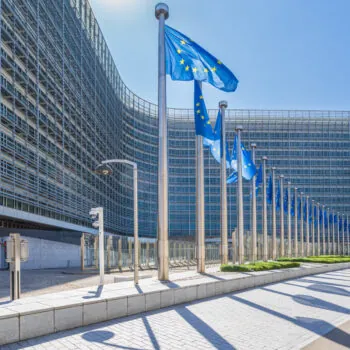This expert interview between Elisa Giannelli and Ursula Woodburn aims to highlight the business opportunities surrounding the establishment of the European Climate Change Council (ECCC), an independent advisory body, as proposed in the European Climate Law.
The interview sheds light on key issues surrounding the independent body as well as on the importance of revising existing climate governance to effectively deliver the European Green Deal.
Ursula Woodburn is a Programme Director at Corporate Leaders Group Europe. Through her role, she drives further corporate engagement on the long-term climate strategy and building a sustainable European economy. She manages the Corporate Leaders Group Europe, the We Mean Business EU Policy Group and the EU Green Growth Platform, which creates a common space for governments, businesses and parliamentarians to collaborate in support of a greener EU economy.
Elisa Giannelli is a Policy Advisor in the E3G Brussels office, where she collaborates with Brussels-based NGOs, business associations and policymakers on EU energy and climate policies. Her areas of expertise include political analyses and coalition building in the framework of financing a clean energy transition, European climate governance and energy infrastructure policy.
EG: Hello Ursula, thank you very much for taking the time to speak.
UW: Thanks – it’s my pleasure.
EG: As part of the EU Climate Law negotiations, the EU Parliament is proposing an independent expert advisory body known as the European Climate Change Council (ECCC) be established . Why are these types of bodies fast becoming recognised as an essential part of effective climate policy?
UW: Climate change is a long-term challenge that will require some difficult policy decisions. Politicians will inevitably face pressures that risk stalling or slowing the transition – such as the COVID-19 public health crisis. A non-political technical advisory body can be extremely useful in providing the scientific and economic arguments to help citizens and politicians alike understand the importance of taking the necessary decisions when required. This will reduce uncertainty for industry and provide the maximum time possible to adapt to new laws and regulations.
EG: So how can the ECCC support policy stability, essential for businesses making long-term plans and investments?
UW: The ECCC will be able to take a long-term view on the technology risks and opportunities and recommend actions that are necessary now to avoid the need for disruptive and expensive future changes in direction. The COVID-19 experience confirms that the future is uncertain. An independent, expert, risk-managed approach to policymaking will help protect societies and economies from the shocks and disruptions of poorly anticipated risks and help them to be ready to quickly take advantage of emerging opportunities. Maintaining policy consistency will promote stability in the long-term direction of travel for the economy and provide the best possible environment for industrial investment.
EG: Some European Member States already have independent advisory bodies at the national level. What would be the added value of having a European-wide advisory body?
UW: The ECCC will act as a learning body, responsible for knowledge sharing to ensure that the latest information is available to all. An effective ECCC will be constantly monitoring progress with research, innovation, and deployment of technologies that businesses across the EU must understand. It presents the opportunity to level-up knowledge of technical issues, thereby improving competitiveness for industry regardless of where it is based.
The ECCC would need to establish a clear expert view on future technology costs and deployment potentials to assess the effectiveness of policies in delivering carbon reduction targets. This would recognise inherent uncertainties and highlight where the deployment of low carbon technologies and approaches should be progressed now and where options should be created to take advantage of future opportunities. This will ensure that those businesses with existing products that support the transition to a climate neutral economy will be able to move at a pace to access finance, gain scale, and develop supply chain capacity.
EG: With the updated 2030 climate target and climate neutrality by 2050, research and innovation developments are quickly becoming crucial for European industries’ competitiveness. How can the ECCC contribute to this?
UW: Beyond its function of knowledge sharing, the ECCC will also be able to identify where action is required to support the deployment of developed technologies and where innovation is required to solve challenges for which there are currently no cost-effective solutions. A focus on innovation will ensure that EU funds are spent helping EU businesses solve the challenges of transitioning to a net-zero future.


